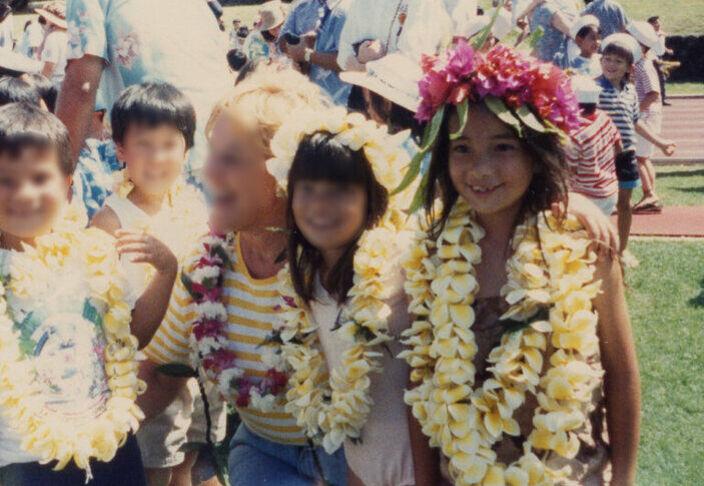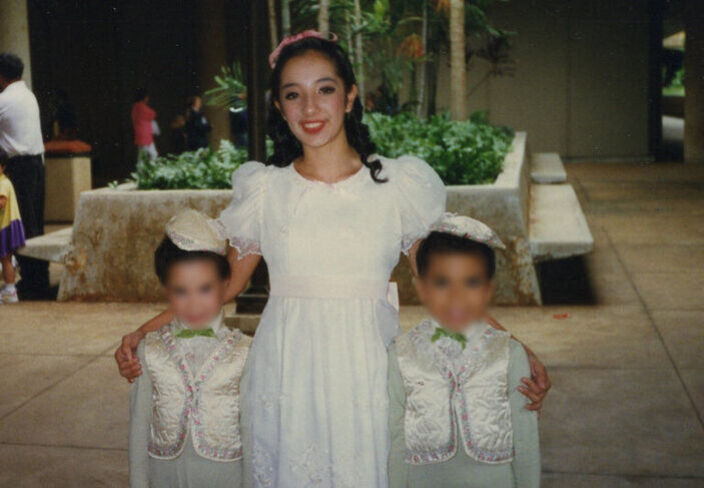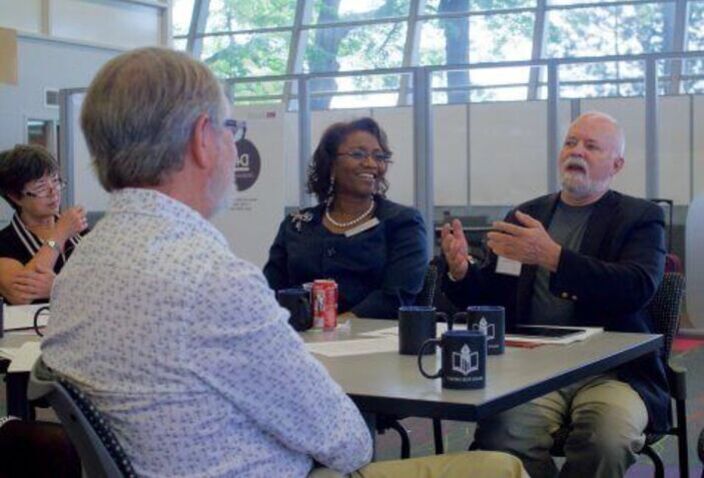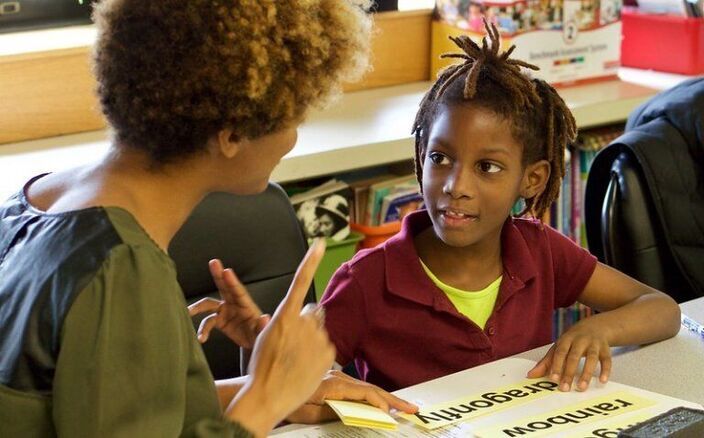Posted on
Honoring identities and pursuing excellence: meet Valerie Sakimura, DFI’s new executive director
Categories: Leadership, Organization
Growing up in Hawai’i, Valerie Sakimura and many of her peers spoke Hawaiian Pidgin, a local dialect often used at home and heard in everyday conversation – but never at school. In academic and formal settings, “it was looked down on as an uneducated way to speak and write,” she explains.
But Valerie encountered a surprisingly different experience through her high school English teacher. With a rigorous approach to instruction, he taught students to analyze literary works in both standard English and Pidgin. It was the first time that Valerie and her friends had experienced Pidgin being treated by an educator as worthy of deep study and analysis, and they felt affirmed and validated.
“That’s the power of an educator,” she says. “To lift up and recognize the different identities and capacities that students bring, and open up opportunities and different ways of engaging and thinking.”
Honoring identities and pursuing excellence: it’s the modus operandi with which Valerie has led in her own career. It’s how she showed up with deans, program faculty, teacher-educators, and aspiring teachers in her role as vice president of program at Deans for Impact (DFI) over the last seven years. Now, as DFI’s executive director, Valerie brings that approach to envisioning the next chapter of our organization as we continue to work towards our mission of ensuring that every child has well-prepared teachers.

As she begins her new role, Valerie shares reflections on the experiences that have shaped her leadership, and discusses leading DFI during this critical moment for our education system:
Tell us how you got started in education.
When I was little, I loved dance class so much. I was also on scholarship, which meant I was serving as a teacher’s assistant for younger kids at the studio…and I loved it. I loved getting to know kids and breaking the steps down in ways that built their confidence. The best part was their performances, getting to see them shine on stage. Those were my first experiences as an educator, and they made me excited about the potential of teaching.
At the same time, I grew up experiencing different types of schools: private, traditional public, and public charter. Those vastly distinct experiences sparked my intellectual interest: what is education? What is the purpose of schooling? Why do some students seem to have access to more opportunities than others depending on what schools they go to or what teachers they have?

My first jobs in the education field were at the systems level, working in funding and policy to catalyze broader social movement and change in education. During this time, I kept coming back to: it’s actually the interactions between the teacher and student where true learning and change happens. You can have many different school models, new technology, or new school policies, but ultimately, it comes back to what happens in the interactions between teachers, students, and content.
What led you to join DFI as a founding staff member?
In 2014, I was working for a philanthropic organization interested in strengthening teacher preparation and looking for organizations that might be part of that solution. In that role, I had the opportunity to work with Benjamin Riley [DFI’s founder and former executive director], who was focused on establishing an organization born out of bringing together a collective of leaders in educator preparation. Because of my role, Ben and I were in the thick of strategic decision-making around: what should DFI be as an organization? What should it set out to accomplish?
I learned that Ben’s goal was to home in at the start of teachers’ careers and build their understanding of how people learn and their use of evidence-based practices. He envisioned the work in a way that honored the voices and expertise of those within the field. I saw this as a real opportunity – shaping not only the foundational skills of these new teachers embarking on their careers, but also the beliefs and mindsets about what students are capable of, would impact so many students over the decades they were in the classroom.
How have experiences with educator-preparation leaders and faculty shaped the way you think about change in the field?
DFI was created at a time when there was a lot of negative rhetoric about teacher preparation – that faculty and leaders didn’t want to change or improve, and didn’t care about candidates and students. Yet, it became increasingly clear through the leaders and teams we were partnering with at DFI that this was far from the truth.

For example, through our Learning by Scientific Design network, we’ve engaged with many clinical educators who are deeply invested in the growth of the future teachers they’re supporting and care very much about what happens to students in classrooms. They tell us, “We never have these opportunities to come together as a group to examine our practice.” There are a lot of structural reasons why that is the case, and these folks were eager for opportunities to collaborate, grow, and develop. Working with them, we see this openness to improving and desire to do what is best for teachers and students. There’s a huge amount of potential teacher-educators have in driving change.
You’re leading DFI during a critical moment for our education system. What’s top-of-mind for you?
Over the last two and a half years, we’ve seen major disruptions to schooling that have resulted in massive gaps in opportunities to learn. The gaps are greatest for students of color, students from low-income families, emerging multilingual students, and other students from historically marginalized communities. More than ever, we need a diverse workforce of excellent teachers who can provide environments of belonging, care, and safety for students and also have the instructional expertise to ensure all students will be able to thrive.
At the same time, many communities are facing significant teacher shortages or experiencing concern about the sustainability of their pipelines. I’m thinking about what we, and the field of educator preparation, can do to address urgent short-term needs, while also continuing to center the fundamentals of teaching and learning that will allow teachers to effectively support students long-term.
In addition to continuing our core programming like Impact Academy and the Learning by Scientific Design network, I’m very excited about several new efforts at DFI that support teachers, and those who prepare them, to center on some of those important fundamentals:
- The Early Literacy by Scientific Design network, a cross-institutional collaboration we’re leading with educator-preparation programs in East Texas focused on fostering early literacy teaching skills grounded in evidence-based scientific principles of how students learn to read.
- The Aspiring Teachers as Tutors network, a national network of educator-preparation programs representing 13 states that aims to: (1) increase the number of aspiring teachers serving as tutors in schools, and (2) improve instruction through clinical practice and small-group tutoring opportunities.
- Our Learning by Scientific Design library, a collection of asynchronous modules and resources we offer to educator-preparation programs that’s designed to equip teachers, and those who prepare them, with the tools to develop teaching practice grounded in learning science.
Why should every child be taught by a well-prepared teacher?
What most parents, including myself, want for their children are for them to have opportunities to thrive, and to lead meaningful lives.
It’s in our PK-12 classrooms that the paths to those opportunities are created. It’s the teachers in the classrooms who support students in not only building knowledge and skills, but also building a sense of self, and a sense of the world.
